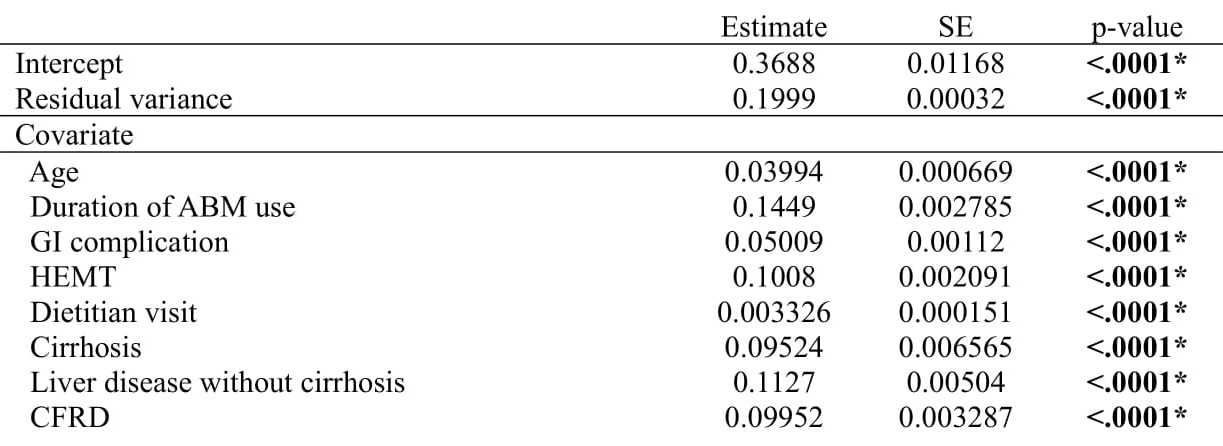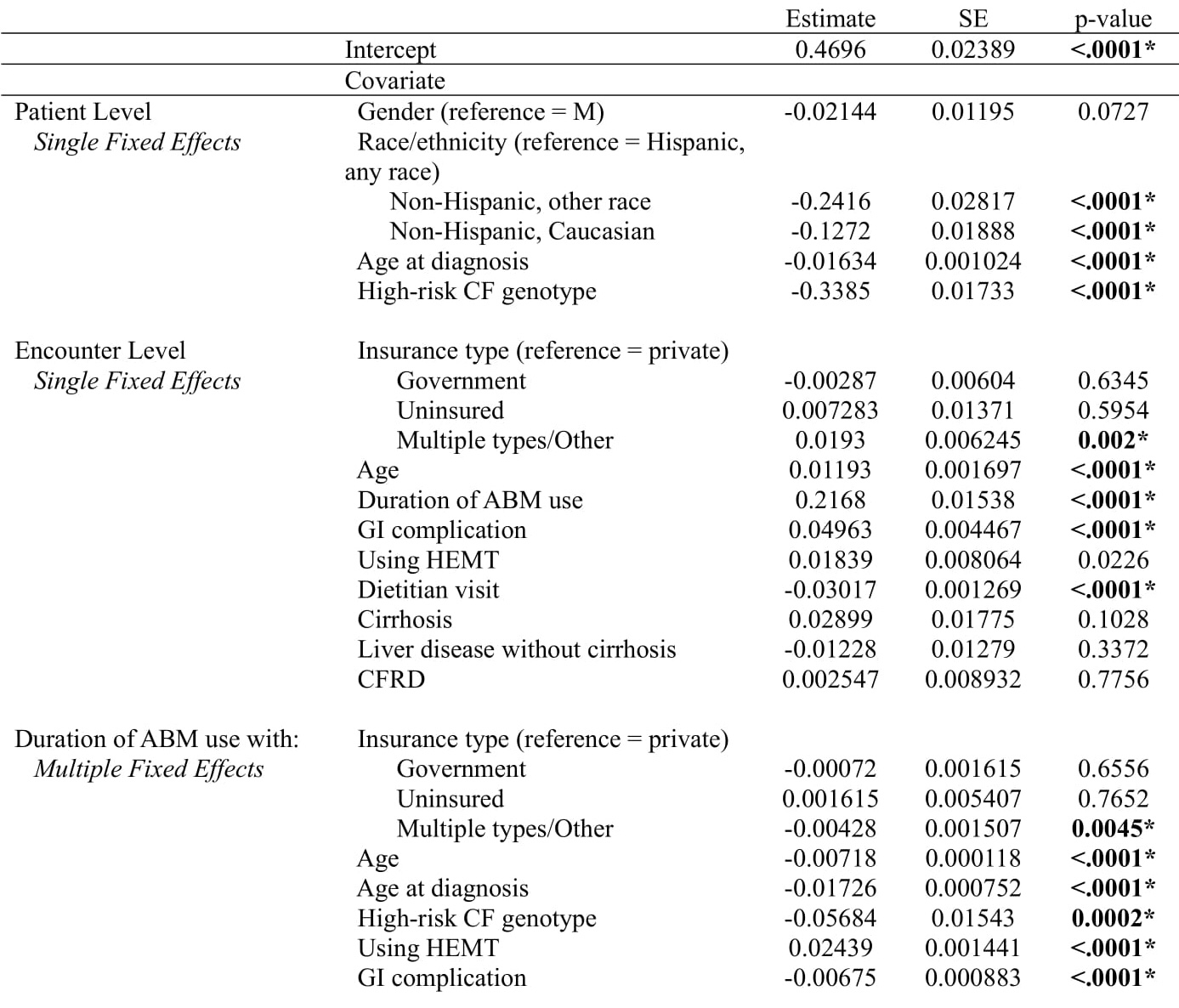Sunday Poster Session
Category: Pediatrics
P1881 - Duration of Acid Blockade Medication Use and Effects on Weight Gain in Patients With Cystic Fibrosis: A Population-wide Analysis
Sunday, October 26, 2025
3:30 PM - 7:00 PM PDT
Location: Exhibit Hall

Bailey Hamner, MD (she/her/hers)
Michigan Medicine
Ann Arbor, MI
Presenting Author(s)
Award: ACG Presidential Poster Award
Bailey Hamner, MD1, Diep Nguyen, PhD2, Eunsook Kim, PhD2, Racha T. Khalaf, MD, MSCS3
1Michigan Medicine, Ann Arbor, MI; 2University of South Florida, Tampa, FL; 3University of South Florida Morsani College of Medicine, Tampa, FL
Introduction: By age 20, more than half of people with CF (PwCF) are prescribed acid blockade medications (ABMs) and remain on them chronically1. Though gastroesophageal reflux disease (GERD) is common in PwCF, ABMs are also often used off-label for hypothesized benefits in weight gain. Concerns exist regarding adverse effects of ABMs in PwCF, including nutrient deficiencies, gastrointestinal (GI) infections, and pulmonary exacerbations. Thus far, this effect has only been investigated in smaller cohorts, with little data on ABM duration. We aimed to investigate the impact of duration of ABM use on body mass index (BMI) and weight-for-length (wfl) z-scores in PwCF.
Methods: We utilized CF Foundation Patient Registry data from 2005-2020. We included PwCF ages 0-19 years. Confounders were selected via directed acyclic graph. Multilevel models were fit with encounters nested within patients. Only significant interactions were retained in the final model. Statistical significance is set at α=0.01.
Results: Our cohort contained 26,870 PwCF with >1.2 million encounters. 77% used ABMs at least once. Mean duration of use was 3.28 years (SD 3.59). The null model had strong BMI/wfl z-score clustering within patients (ICC=67%). The final model reduced encounter- and patient-level variance by 50.4% and 45.1%, respectively. Residual distribution was approximately normal (skewness=-0.41, kurtosis=3.05). Cumulative ABM use was associated with a small but significant z-score increase (estimate 0.22, p< .0001), as was Hispanic ethnicity, low-risk genotype, older age, combined insurance, earlier CF diagnosis, GI complication, or no dietician visit (Table 1). All variables had significant between-patient variance (Table 2). ABM use had a more negative impact in PwCF that had GI complications, high-risk genotypes, combined insurance, or older age, and a positive impact in PwCF on HEMT.
Discussion: Cumulative ABM use was associated with a statistically significant but clinically negligible increase in BMI/wfl z-scores in PwCF. ~Five years of ABM use are required to see a one unit increase in z-score. There was significant individual variance, with negative effects observed in several subgroups. Lack of consistent benefit and presence of subgroup-specific risks challenges the routine use of ABMs for weight gain in CF, which remains a common clinical practice. This highlights the need for individualized nutrition and GERD management in PwCF.
1. CF Foundation Patient Registry: 2023 Data Report. CF Foundation. 9/2024.

Figure: Table 1: Fixed effects of final model
* indicates statistically significant at α = .01
GI complications=distal intestinal obstruction syndrome, fibrosing colonopathy/colonic stricture, GERD, GI bleed, pancreatitis, peptic ulcer disease, rectal prolapse, or history of intestinal or colon surgery

Figure: Table 2: Random effects of final model
* indicates statistically significant at α = .01
Disclosures:
Bailey Hamner indicated no relevant financial relationships.
Diep Nguyen indicated no relevant financial relationships.
Eunsook Kim indicated no relevant financial relationships.
Racha Khalaf: Sanofi – Advisory Committee/Board Member.
Bailey Hamner, MD1, Diep Nguyen, PhD2, Eunsook Kim, PhD2, Racha T. Khalaf, MD, MSCS3. P1881 - Duration of Acid Blockade Medication Use and Effects on Weight Gain in Patients With Cystic Fibrosis: A Population-wide Analysis, ACG 2025 Annual Scientific Meeting Abstracts. Phoenix, AZ: American College of Gastroenterology.
Bailey Hamner, MD1, Diep Nguyen, PhD2, Eunsook Kim, PhD2, Racha T. Khalaf, MD, MSCS3
1Michigan Medicine, Ann Arbor, MI; 2University of South Florida, Tampa, FL; 3University of South Florida Morsani College of Medicine, Tampa, FL
Introduction: By age 20, more than half of people with CF (PwCF) are prescribed acid blockade medications (ABMs) and remain on them chronically1. Though gastroesophageal reflux disease (GERD) is common in PwCF, ABMs are also often used off-label for hypothesized benefits in weight gain. Concerns exist regarding adverse effects of ABMs in PwCF, including nutrient deficiencies, gastrointestinal (GI) infections, and pulmonary exacerbations. Thus far, this effect has only been investigated in smaller cohorts, with little data on ABM duration. We aimed to investigate the impact of duration of ABM use on body mass index (BMI) and weight-for-length (wfl) z-scores in PwCF.
Methods: We utilized CF Foundation Patient Registry data from 2005-2020. We included PwCF ages 0-19 years. Confounders were selected via directed acyclic graph. Multilevel models were fit with encounters nested within patients. Only significant interactions were retained in the final model. Statistical significance is set at α=0.01.
Results: Our cohort contained 26,870 PwCF with >1.2 million encounters. 77% used ABMs at least once. Mean duration of use was 3.28 years (SD 3.59). The null model had strong BMI/wfl z-score clustering within patients (ICC=67%). The final model reduced encounter- and patient-level variance by 50.4% and 45.1%, respectively. Residual distribution was approximately normal (skewness=-0.41, kurtosis=3.05). Cumulative ABM use was associated with a small but significant z-score increase (estimate 0.22, p< .0001), as was Hispanic ethnicity, low-risk genotype, older age, combined insurance, earlier CF diagnosis, GI complication, or no dietician visit (Table 1). All variables had significant between-patient variance (Table 2). ABM use had a more negative impact in PwCF that had GI complications, high-risk genotypes, combined insurance, or older age, and a positive impact in PwCF on HEMT.
Discussion: Cumulative ABM use was associated with a statistically significant but clinically negligible increase in BMI/wfl z-scores in PwCF. ~Five years of ABM use are required to see a one unit increase in z-score. There was significant individual variance, with negative effects observed in several subgroups. Lack of consistent benefit and presence of subgroup-specific risks challenges the routine use of ABMs for weight gain in CF, which remains a common clinical practice. This highlights the need for individualized nutrition and GERD management in PwCF.
1. CF Foundation Patient Registry: 2023 Data Report. CF Foundation. 9/2024.

Figure: Table 1: Fixed effects of final model
* indicates statistically significant at α = .01
GI complications=distal intestinal obstruction syndrome, fibrosing colonopathy/colonic stricture, GERD, GI bleed, pancreatitis, peptic ulcer disease, rectal prolapse, or history of intestinal or colon surgery

Figure: Table 2: Random effects of final model
* indicates statistically significant at α = .01
Disclosures:
Bailey Hamner indicated no relevant financial relationships.
Diep Nguyen indicated no relevant financial relationships.
Eunsook Kim indicated no relevant financial relationships.
Racha Khalaf: Sanofi – Advisory Committee/Board Member.
Bailey Hamner, MD1, Diep Nguyen, PhD2, Eunsook Kim, PhD2, Racha T. Khalaf, MD, MSCS3. P1881 - Duration of Acid Blockade Medication Use and Effects on Weight Gain in Patients With Cystic Fibrosis: A Population-wide Analysis, ACG 2025 Annual Scientific Meeting Abstracts. Phoenix, AZ: American College of Gastroenterology.

